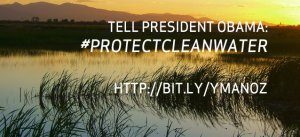By Jamie Rhodes, Rhode Island Director
We are in the midst of a dangerous conversation across this nation about the interplay of our economy and our environment. Claims that laws and regulations designed to protect the environment, public health and natural resources are a barrier to economic growth are ceaseless. These arguments attempt to create false choice for our elected decision makers – either the environment or the economy – when the reality couldn't be further from the truth.
In Rhode Island, there has been an effort to move environmental and coastal permitting to an Executive Office of Commerce in order to “reduce red tape.” A worthy goal in theory, but it practice it can mean threatening hard-earned public health and environmental protections. This week, Senator Whitehouse and five others
signed a letter to the President stating concerns that the White House’s Office Management and Budget is unnecessarily delaying federal health and environmental safeguards. It is the same fight in two places.
Thank you, Senator. Thank you for calling for the release of our captive safeguards. Thank you for pushing for more protection of our vital waterways. Thank you for supporting the Environmental Protection Agency’s efforts to protect the public from known toxic chemicals. Thank you for being a voice of reason as our political gridlock continues to undermine national progress.
Protecting our environment and public health does not always fit neatly into the mold of a cost/benefit analysis or scrutiny under a theory of unnecessary red tape. We need to do better at expressing the benefits of protecting human health by requiring a change in chemicals used in consumer products, for example. Why is permitting to protect fragile ecosystems and limited coastlines considered red tape? The public has a vested interest in its health and that of our planet since it’s our life support system.
When we scrutinize protections, which is a valid endeavor, we need to take all this into consideration in a much for formal way. We got to the point of needing a federal environmental agency because private interests ‘cost/benefit analysis’ simply will not lead to the actions needed to protect the common good and our life support systems. Love Canal and the fire on the Cuyahoga are not so long ago. Thank you, Senator Whitehouse, for your continued support for common sense government programs which benefit us all. I thought that is what government was designed to do, but sometimes we all need a little push.



